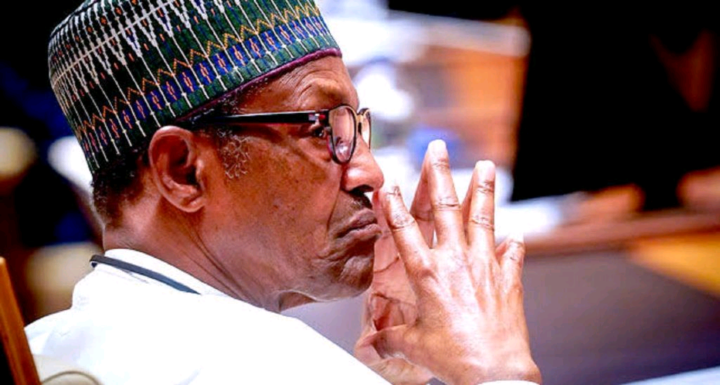Former Nigerian President Muhammadu Buhari’s legacy has come under renewed scrutiny following a critical article by The Economist, which claims that he missed two historic opportunities to build a stronger, more unified, and prosperous Nigeria. The British publication, known for its detailed political and economic analyses, argued that Buhari’s leadership — both as military ruler in the 1980s and as a two-term democratically elected president from 2015 to 2023 — failed to deliver the reform and vision necessary to transform Africa’s most populous nation.
The piece reflects on Buhari’s return to power after more than three decades, which had initially inspired hope among Nigerians disillusioned by widespread corruption, insecurity, and economic mismanagement. In 2015, he was elected with widespread support, promising to tackle corruption, defeat terrorism, and rebuild the nation’s economy. At the time, many saw him as a rare figure of integrity with the discipline to steer Nigeria back on track.

However, according to The Economist, those promises largely went unfulfilled. Despite leading the country for eight years with a strong political mandate, Buhari’s tenure was characterized by economic stagnation, growing insecurity, and a deepening sense of disillusionment among citizens.
On the economic front, Buhari’s policies were marked by heavy reliance on oil revenues, rigid currency controls, and protectionist trade measures that, while aimed at boosting local production, often led to inflation and shortages. The naira lost significant value under his administration, and inflation soared to double digits for much of his time in office. Many businesses struggled with foreign exchange restrictions, while foreign investors grew wary of Nigeria’s opaque and inconsistent economic environment.
Additionally, unemployment and poverty increased significantly during Buhari’s presidency. Youth unemployment hit record highs, and despite government programs like the N-Power initiative and TraderMoni, the scale of poverty and hardship remained daunting. Critics argue that Buhari’s administration failed to articulate and implement a coherent strategy for inclusive growth or industrial development.
In the security sector, Buhari’s military background led many to expect swift action against the Boko Haram insurgency and other violent groups. While some territorial gains were made against Boko Haram early in his administration, insecurity worsened over time. New threats emerged, including widespread banditry in the northwest, farmer-herder clashes in the middle belt, and increased kidnappings across the country. The spread of insecurity, coupled with perceived inaction and inadequate response from federal authorities, eroded public confidence in the government’s ability to protect lives and property.
The Economist also criticized Buhari’s approach to governance, describing it as insular and lacking in transparency. His administration was often perceived as slow to respond to national crises and reluctant to communicate clearly with the public. Appointments to key positions were frequently seen as skewed toward a narrow group of allies, leading to allegations of nepotism and marginalization of other regions.
Civil liberties came under pressure as well, with notable crackdowns on protesters and increased regulation of digital platforms. The 2020 #EndSARS protests against police brutality were met with force, culminating in the controversial incident at the Lekki toll gate, which drew international condemnation and further strained the government’s relationship with its youth population.
In the fight against corruption — one of Buhari’s core campaign promises — some high-profile arrests were made, and a number of recovered funds were announced. However, critics argue that anti-corruption efforts lacked institutional depth and were selectively applied. Some accused the administration of shielding allies while targeting opponents, undermining the credibility of the campaign.
Despite these criticisms, Buhari’s supporters argue that he inherited a nation in deep crisis and that he prioritized long-term reforms such as infrastructure development, rail expansion, and agricultural revival. They also cite efforts to increase power generation and improve digital economy frameworks as achievements that will bear fruit in years to come.
Nonetheless, The Economist concluded that Buhari’s two chances to remake Nigeria — first as a military ruler and later as a democratic leader — were ultimately wasted. It suggests that he failed to rise to the moment, instead presiding over a period marked by missed opportunities, worsening social divisions, and rising economic distress.
Now, with President Bola Tinubu at the helm, many Nigerians are hoping for a new chapter that addresses the shortcomings of the past and sets a clearer path forward. Yet the challenges remain enormous, from rebuilding public trust to tackling entrenched corruption, to diversifying the economy and stabilizing the currency.
The debate over Buhari’s legacy is far from over, and as analysts, historians, and citizens reflect on his era, the consensus appears to be forming around a narrative of unfulfilled promise. For many, the real question now is whether future leaders can learn from those missteps — and whether Nigeria can finally break free from its cycles of economic mismanagement, insecurity, and lost potential.
Support InfoStride News' Credible Journalism: Only credible journalism can guarantee a fair, accountable and transparent society, including democracy and government. It involves a lot of efforts and money. We need your support. Click here to Donate
